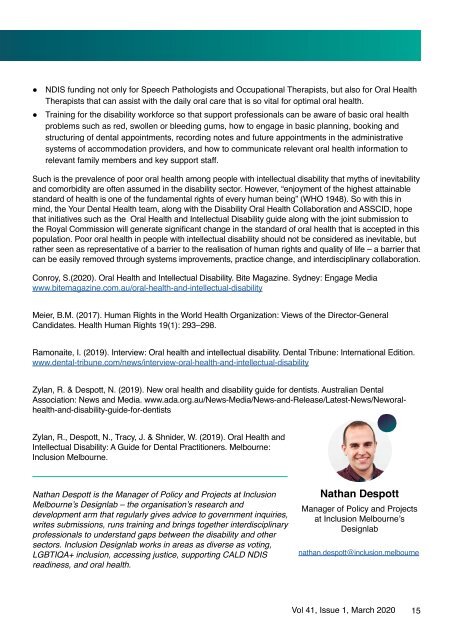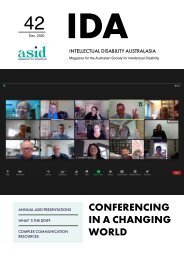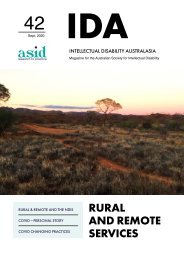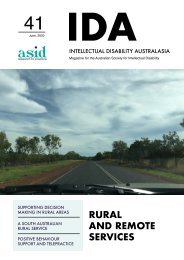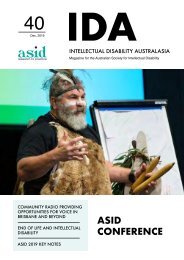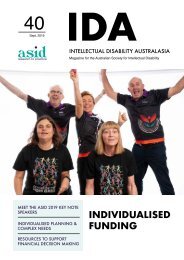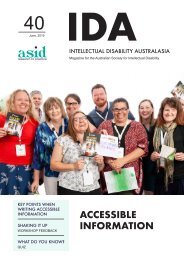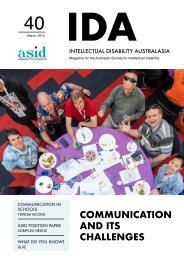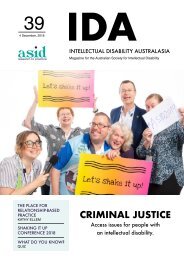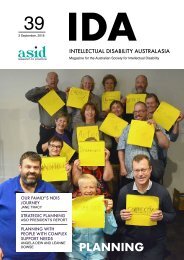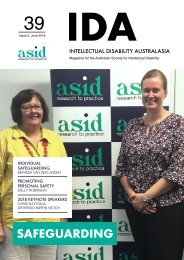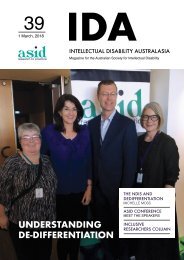IDA Volume 41 Issue 1 March 2020 (Mar 2020)
You also want an ePaper? Increase the reach of your titles
YUMPU automatically turns print PDFs into web optimized ePapers that Google loves.
●<br />
●<br />
NDIS funding not only for Speech Pathologists and Occupational Therapists, but also for Oral Health<br />
Therapists that can assist with the daily oral care that is so vital for optimal oral health.<br />
Training for the disability workforce so that support professionals can be aware of basic oral health<br />
problems such as red, swollen or bleeding gums, how to engage in basic planning, booking and<br />
structuring of dental appointments, recording notes and future appointments in the administrative<br />
systems of accommodation providers, and how to communicate relevant oral health information to<br />
relevant family members and key support staff.<br />
Such is the prevalence of poor oral health among people with intellectual disability that myths of inevitability<br />
and comorbidity are often assumed in the disability sector. However, “enjoyment of the highest attainable<br />
standard of health is one of the fundamental rights of every human being” (WHO 1948). So with this in<br />
mind, the Your Dental Health team, along with the Disability Oral Health Collaboration and ASSCID, hope<br />
that initiatives such as the Oral Health and Intellectual Disability guide along with the joint submission to<br />
the Royal Commission will generate significant change in the standard of oral health that is accepted in this<br />
population. Poor oral health in people with intellectual disability should not be considered as inevitable, but<br />
rather seen as representative of a barrier to the realisation of human rights and quality of life – a barrier that<br />
can be easily removed through systems improvements, practice change, and interdisciplinary collaboration.<br />
Conroy, S.(<strong>2020</strong>). Oral Health and Intellectual Disability. Bite Magazine. Sydney: Engage Media<br />
www.bitemagazine.com.au/oral-health-and-intellectual-disability<br />
Meier, B.M. (2017). Human Rights in the World Health Organization: Views of the Director-General<br />
Candidates. Health Human Rights 19(1): 293–298.<br />
Ramonaite, I. (2019). Interview: Oral health and intellectual disability. Dental Tribune: International Edition.<br />
www.dental-tribune.com/news/interview-oral-health-and-intellectual-disability<br />
Zylan, R. & Despott, N. (2019). New oral health and disability guide for dentists. Australian Dental<br />
Association: News and Media. www.ada.org.au/News-Media/News-and-Release/Latest-News/Neworalhealth-and-disability-guide-for-dentists<br />
Zylan, R., Despott, N., Tracy, J. & Shnider, W. (2019). Oral Health and<br />
Intellectual Disability: A Guide for Dental Practitioners. Melbourne:<br />
Inclusion Melbourne.<br />
Nathan Despott is the Manager of Policy and Projects at Inclusion<br />
Melbourne’s Designlab – the organisation’s research and<br />
development arm that regularly gives advice to government inquiries,<br />
writes submissions, runs training and brings together interdisciplinary<br />
professionals to understand gaps between the disability and other<br />
sectors. Inclusion Designlab works in areas as diverse as voting,<br />
LGBTIQA+ inclusion, accessing justice, supporting CALD NDIS<br />
readiness, and oral health.<br />
Nathan Despott<br />
Manager of Policy and Projects<br />
at Inclusion Melbourne’s<br />
Designlab<br />
nathan.despott@inclusion.melbourne<br />
Vol <strong>41</strong>, <strong>Issue</strong> 1, <strong><strong>Mar</strong>ch</strong> <strong>2020</strong><br />
15


